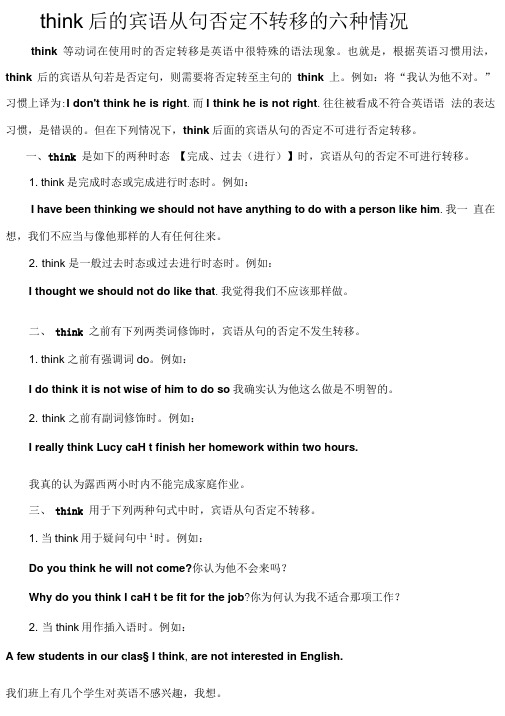think后的宾语从句否定不转移的六种情况
- 格式:doc
- 大小:30.00 KB
- 文档页数:2

否定转移的用法公司内部编号:(GOOD-TMMT-MMUT-UUPTY-UUYY-DTTI-否定转移的用法1) 将think, believe, suppose, expect, fancy, imagine等动词后面宾语从句的否定词转移到主句中,即主句的谓语动词用否定式,而从句的谓语动词用肯定式。
I don”t think I know you. 我想我并不认识你。
I don” t believe he will come. 我相信他不回来。
注意:若谓语动词为hope,宾语从句中的否定词不能转移。
I hope you weren”t ill. 我想你没有生病吧。
2) 将seem, appear 等后的从句的否定转移到前面。
It doesn”t seem that they know where to go.看来他们不知道往哪去。
It doesn”t appear that we”ll have a sunny day tomorrow.看来我们明天不会碰上好天气。
3) 有时将动名词,介词短语或整个从句的否定转变为对谓语动词的否定。
I don”t remember having ever seen such a man.我记得从未见过这样一个人。
(not否定动名词短语 having…)It”s not a place where anyone would expect to see strange characters on the street.在这里,人们不会想到在街上会碰上陌生的人。
(anyone 作主语,从句中的谓语动词不能用否定形式。
)否定转移用法总结kenny128 (2006-03-11 12:52)有感于课文中一句话的理解)山东高唐一中刘长友外研版的新课标英语课本第二册Module 1 “Zhou Kai(2)p2中有这样一句话:I think I don’t get these things because I take a lot of exercise and am very fit.不少有学有基础的学生,其中包括一些老师,对这一个句子中,该不该用否定转移的句子,展开了激烈讨论。

关于宾语从句中的否定前移作者:刘晓侠来源:《新课程学习·下》2014年第06期摘要:中学英语中的否定前移是宾语从句的一个典型句式,也是高中英语教学中必然会强调的一个句子。
通常教师会以主句谓语动词“think”为例进行讲解,然后类推提到有相同用法的其他表示“认为,相信,猜测”概念的动词“believe,suppose,expect,imagine,fancy,consider,guess,reckon等”。
那么,什么是否定前移?否定前移就是“把语义上属于that从句的否定转移至主句的现象”。
因为强调了这个语法现象,所以很多人就认为:I don’t think...符合语法要求,而I think...not...则不然。
事实是这两种用法在以英语为母语的国家都存在,且两种形式在句法和语义意义上都是正确的。
以think为例谈谈其宾语从句的否定前移与否的问题。
关键词:英语教学;宾语从句;否定前移通常,如果主句主语是第一人称,时态是一般现在时且谓语动词是表示“认为,相信,猜测”概念的动词时,其后“that”引导的宾语从句若含有否定意义,一般要把否定词移到主句谓语上,从句谓语用肯定式。
例如,(1)I don’t think he can do it better than me. 我想他不会比我干得更好。
(2)I don’t think so.(=I think not.)注意:口语中可以用so 或者not替代这些动词之后的肯定或否定的宾语从句,以避免重复。
例如,I believe so./ I believe not./ I don’t believe so. 通常I don’t think/ believe/ imagine so.比用not 更常见。
但是hope则只能用not,不能用I don’t hope so.而应该用I hope not/so.(3)I don’t suppose he cares, does he?我看他不在乎,对吧?注意:这类句子的反义疑问句应该与从句一致。

think否定转移的用法分析(一)当主语是第一人称,think, believe, expect, guess 等谓语动词接that宾语从句时,如果用否定式,否定意义要转移到从句的谓语。
例如:I don't think he is honest. “我认为他不诚实。
”但我却看到这样一个句子:He doesn't think you realize the gravity of the situation. “他认为你没意识到局势的严重性。
”我的疑问是,这个句子主句的主语是第三人称,为什么也否定转移了呢?关于这个问题,实际上适用于各种人称,不单纯是第一人称。
所以,完全可以说:He doesn't think you realize the gravity of the situation.关于此问题,我想说明一下个人的理解:I don't think he is honest. 在翻译成汉语时,不一定非要把“否定”转移到从句。
以下两种译法都对:“我认为他不诚实。
”“我不认为他诚实。
”如果把以上两句汉语再翻译成英语时,则要按英语的习惯来翻译,应把否定词转移到主句上来,应说:I don't think he is honest. 不说:I think he isn’t honest.由此说明,汉语翻译是否转移不受限制,而英语的转移则是习惯要求的。
此外,下列情况,否定则不转移。
1. 如果否定词不是not,而是never, hardly 等,则不转移。
因为一旦转移,意思跟原来不符。
例如:I think he will never escape hard work. 我想他永远逃避不了辛苦的工作。
We think she can hardly finish the job in one day. 我们认为她很难在一天内完成这项工作。
2. 如果think有其他成分修饰,则不转移。

think后的宾语从句否定不转移的六种情况think等动词在使用时的否定转移是英语中很特殊的语法现象。
也就是,根据英语习惯用法,think后的宾语从句若是否定句,则需要将否定转至主句的think上。
例如:将“我认为他不对。
” 习惯上译为:I don't think he is right.而I think he is not right.往往被看成不符合英语语法的表达习惯,是错误的。
但在下列情况下,think后面的宾语从句的否定不可进行否定转移。
一、think 是如下的两种时态【完成、过去(进行)】时,宾语从句的否定不可进行转移。
1. think是完成时态或完成进行时态时。
例如:I have been thinking we should not have anything to do with a person like him.我一直在想,我们不应当与像他那样的人有任何往来。
2. think 是一般过去时态或过去进行时态时。
例如:I thought we should not do like that.我觉得我们不应该那样做。
二、think 之前有下列两类词修饰时,宾语从句的否定不发生转移。
1. think 之前有强调词do。
例如:I do think it is not wise of him to do so我确实认为他这么做是不明智的。
2. think 之前有副词修饰时。
例如:I really think Lucy caH t finish her homework within two hours.我真的认为露西两小时内不能完成家庭作业。
三、think 用于下列两种句式中时,宾语从句否定不转移。
1. 当think用于疑问句中1时。
例如:Do you think he will not come?你认为他不会来吗?Why do you think I caH t be fit for the job?你为何认为我不适合那项工作?2. 当think用作插入语时。

think后面加to do还是doingthink后面加to do。
think不能直接加doing,think后面加doing只有两种情况,1、think about doing考虑做某事;2、think of doing想起,想到要做某事。
think的用法一、think+宾语从句认为……例如:1. I think you should phone Jenny and say sorry to her.2. I think she should have paid the money back. 我认为她本应该偿还那笔钱的。
二、如果要否定think后面宾语从句的内容,常常用否定主句谓语动词的方式来表示,这种方式被称为否定转移,多用在第一人称的句子里。
例如: I don’t think he saw me. 我认为他没有看见我。
三、think sb / sth (to be) sth 及 sb / sth be thought to be sth / to do sth例如: We all thought her (to be) very intelligent.四、think+it+形容词/ 名词+(for sb)to do sth / that 从句,表示“认为某人做某事怎么样“, it 是形式宾语,(for sb)to do sth 即不定式的复合结构或that 从句作真正的宾语,此时的that 不可省去。
例如:2. I think it important that young people should learn English well. 我认为年轻人学好英语是重要的。
3. I think it our duty to help those who need help. 我认为帮助需要帮助的人是我们的责任。
五、 I think so. / I don’t think so. / I think not. 它们的意思是“我认为这样/我不这样认为/我认为不是”,可用来肯定或否定上下文提到的内容和对方所说的话。

Suppose 的用法suppose 是及物动词,在实际运用中,常用来表示说话人的看法、猜测或提出假设。
为了帮助大家正确使用suppose 一词,现将其用法归纳如下:1.“sup p o se+(that)从句”,表示“猜测;认为”,若从句是否定形式,用法同 guess,think ,believe ,应将否定前移至主句。
如:I suppose (that)you are right .我想你是对的。
I don't suppose my friend can finish this work .我猜想我的朋友不能完成这项工作。
2.“sup p o se+名词/代词+介词短语”表示“猜测某人/某物在……”。
如:I supposed him in the classroom .我猜想他在教室里。
3.“sup p o se+名词/代词+动词不定式”表示“猜想某人做某事”。
如:I supposed her to be in the reading-room .我猜想她在阅览室。
All his neighbours supposed him to be a doctor .他的邻居都猜他是医生。
4.suppose 还可用于插入语中。
如:Y ou don't mind m y smoking ,I suppose .我想,您不会介意我吸烟吧。
Who do you suppose telephoned today ?你猜今天谁打过电话?5.be supposed to d o sth .表示“应该”、“应当”,是指根据规定或按照法律,人们不得不做的事,或期待将要发生的事。
如:Y ou're supposed t o s tart work at 8 o'clock every morning .你理应每天早晨 8 点开始工作。
Y ou aren't supposed t o t ake the b ooks out of the reading-room .你不该把这些书拿出阅览室。
关于 think 用法的几点注意事项1. 作谓语动词时,否定前移现象 . 类似的词有:suppose, believe, expect, imagineI don’t think he will come. /I don’t imagine they will come if it rains. /I don’t think I know you.2.反意疑问部分主谓的选择 . 当复合句的主语是第一人称,而谓语动词是 think , believe, suppose,imagine, expect等表示认为,猜想,相信的词的一般现在时时, 反意疑问句的主谓与从句一致。
I think that it is a good thing, isn’t it? /I don’t suppose he cares, does he?Compare :You never told us why his brother was thrown into prison, did you?He says that it is true, doesn’t he?This is the first time you h ave operated a computer, isn’t it?3.双重疑问句 . 对它的宾语从句中的某一部分提问时,语序应是疑问词 + +宾语从句其余部分。
和它这种用法相同的词还有 say, suppose, imagine, etc.What do you think the ocean bottom is made up of?Which way do you imagine he went?What do you imagine has happened to him?Who do you think is fit for the job?Whom do you think he lives with?4、简单答语 . So 作代词时,可以作宾语,用在动词 think, hope, expect, suppose, imagine, believe 等的后面。
英语句子的否定转移用法1.当think, believe, suppose, expect, fancy, imagine等动词的主语为第一人称,且本身为一般现在时态时,其后的宾语从句的否定词通常转移到主句中,即主句的谓语动词用否定式,而从句的谓语动词用肯定式。
如:I don’t believe you need worry.我相信你不必忧虑。
I don’t think you need take it too seriously. 我想你不必对此过于认真。
但是,若谓语动词为hope,宾语从句中的否定词不能转移。
如:I hope it doesn’t rain.我希望不要下雨。
I hope you don’t mind my saying it.我希望你别介意我说这些话。
2.许多动词后面可以接动词不定式。
在非正式文体中,我们常常愿意把第一个动词加上否定词,而不用否定的动词不定式。
其实这样做一点也不改变意思。
例如与appear, seem, expect和happen连用时,就是这样的。
如:Sibyl doesn’t seem to like you.西比尔好像不喜欢你。
I don’t expect to see you before Monday.我估计星期一之前不会见到你了。
It does not seem that the man understand what I am saying. 那男人似乎不了解我在说什么。
与“intend / want+动词不定式”连用时,我们几乎总是将not / never与第一个动词放在一起。
如:I don’t want to fail this exam.这次考试我不想考不及格。
After I’ve finished this contract I never intend to teach again. 这个合同期满后,我决不想再教书了。
请注意can’t seem to…这一结构。
关于I d o n t t h i n k句型总结和说明文件管理序列号:[K8UY-K9IO69-O6M243-OL889-F88688]关于I d o n’t t h i n k…句型我们在中学英语中经常会见到这样的句子:But I don't think chickens can swim. 但是我想鸡不会游泳。
I'm sorry, but I don't think I know you. 对不起,但我想我不认识你。
以上例句都是把从句的否定形式转移到主句谓语动词上了。
这是think的一个惯用法。
但并不是说凡是think后面的宾语从句的否定形式都要转移到主句上来。
现将不用否定转移的情况归纳如下:1.当think前面有起强调作用的助动词do, does或did时。
例如:I do think you aren't right. 我确实认为你不对。
We do think he won't come tonight. 我们的确认为他今晚不会来。
2. 当think 用于疑问句时。
例如:Do you really think that I didn't notice it? 你真认为我没有注意到它吗?3. 当think和另一个动词并列时。
例如:I think and hope that I'm not disturbing you too much. 我想并希望我没有太多地打扰你。
4. 当think以完成时或者进行时出现时。
例如:I've always thought high life doesn't agree with us. 我一贯认为高标准生活不适合我们。
5. 当think以过去一般时出现时:如果从句中有肯定词already等时,则是否定主句本身,属于否定转移;如果从句中用了非肯定词yet,at all 等时,则是否定从句,属于否定转移。
think,believe 宾语从句的用法一、否定转移当think, believe, suppose, imagine, expect等动词后接的宾语从句为含有not 的否定句时,该否定应移至主句,即否定主句的谓语动词。
主句是谓语动词是think,believe,imagine,suppose,consider,espect,fancy,guess等,并且主句的主语是第一人称而且为一般现在时,从句的否定词一般要转移到主句上来,例如:I don't think it will rain tomorrow.We don't expect our football team will win the World Cup.但hope后接的宾语从句的否定不需要转移。
例如:I hope you weren't ill. (Unit 15 READING)需要特别说明的是:涉及到转移的只是not,not以外的其它否定词,如no, never, hardly, few, little, seldom等,不必转移。
例如:I believe my brother has never been late for school.We can imagine birds can hardly live without these woods.二、反意疑问句的构成视情况不同有两种think, believe, suppose, imagine, expect等动词后接宾语从句构成的主从复合句在构成反意疑问句时,视情况不同有两种不同的构成方式。
1.当主句的主语为第一人称时,其后的简短问句应与从句相一致。
例如:I expect our English teacher will be back this weekend, won't she/he?We suppose you have finished the project, haven't you?值得注意的是,当这些动词后接的宾语从句的否定转移到主句时,其仍属否定句,故其后的简短问句应用肯定式,而非否定式。
think后的宾语从句否定不转移的六种情况think等动词在使用时的否定转移是英语中很特殊的语法现象。
也就是,根据英语习惯用法,think后的宾语从句若是否定句,则需要将否定转至主句的think上。
例如:将“我认为他不对。
”习惯上译为:I don't think he is right. 而I think he is not right.往往被看成不符合英语语法的表达习惯,是错误的。
但在下列情况下,think后面的宾语从句的否定不可进行否定转移。
一、think是如下的两种时态【完成、过去(进行)】时,宾语从句的否定不可进行转移。
1.think是完成时态或完成进行时态时。
例如:
I have been thinking we should not have anything to do with a person like him.我一直在想,我们不应当与像他那样的人有任何往来。
2.think是一般过去时态或过去进行时态时。
例如:
I thought we should not do like that.我觉得我们不应该那样做。
二、think之前有下列两类词修饰时,宾语从句的否定不发生转移。
1. think之前有强调词do。
例如:
I do think it is not wise of him to do so.我确实认为他这么做是不明智的。
2. think之前有副词修饰时。
例如:
I really think Lucy can't finish her homework within two hours.
我真的认为露西两小时内不能完成家庭作业。
三、think用于下列两种句式中时,宾语从句否定不转移。
1.当think用于疑问句中时。
例如:
Do you think he will not come? 你认为他不会来吗?
Why do you think I can't be fit for the job? 你为何认为我不适合那项工作?
2.当think用作插入语时。
例如:
A few students in our class, I think, are not interested in English.
我们班上有几个学生对英语不感兴趣,我想。
四、think的宾语从句中含有下列两类词时,宾语从句的否定不转移。
1.含有no, never, nothing, nobody等否定词时。
例如:
I think he has nothing to do with it.我认为他与那事无关。
2.含有not at all, not a bit, not a little, not...enough, can't help doing等固定词组时。
例如:
I think he is not happy at all.我认为他一点也不高兴。
五、think充当下列两种情况的谓语时,宾语从句的否定不转移。
1.当think和另一个动词构成并列谓语时,宾语从句的否定不转移。
I think and hope you won't lose heart even if you f ail.
我认为并希望,即使是失败了,你们也不会失去信心的。
**2.当think用作虚拟式谓语had thought,表示“本来认为......"时。
例如:
I had thought Li Lei hadn't passed the English exam .
我原以为李蕾英语没考及格(实际上他及格了)。
六、对上文的的询问表示否定的看法时,not也可以直接置于think之后。
例如:
—Is that Jack?那是杰克吗?
—I think not(=I don't think so).我想不是。